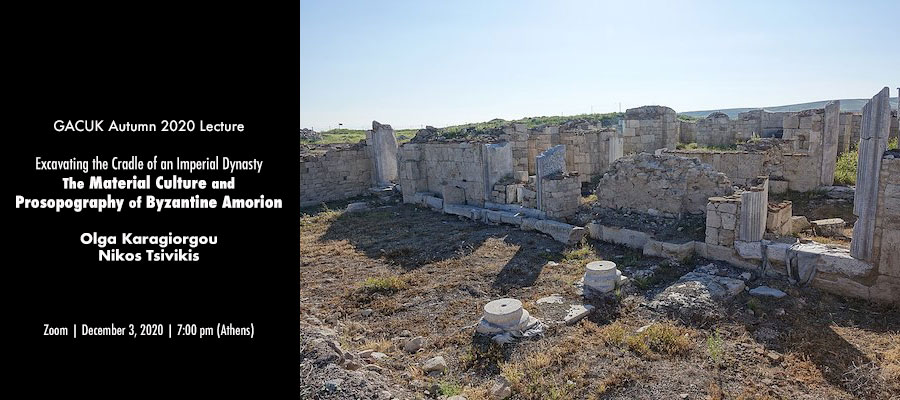Excavating the Cradle of an Imperial Dynasty: The Material Culture and Prosopography of Byzantine Amorion, GACUK Autumn 2020 Lecture by Olga Karagiorgou and Nikos Tsivikis, Zoom, December 3, 2020, 7:00 pm (Athens)
The Greek Archaeological Committee UK is very pleased to announce its 60th lecture entitled “Excavating the Cradle of an Imperial Dynasty: The Material Culture and Prosopography of Byzantine Amorion” by Dr Olga Karagiorgou and Dr Nikos Tsivikis.
Amorion (modern Hisarköy, some 110 miles SW of Ankara, Turkey) occupies a special place in the history of the Byzantine Empire as the capital of one of the most important of its provinces, the thema of the Anatolikoi, and the birthplace of the homonymous short-lived dynasty of Byzantine emperors, the Amorian dynasty (820-867). The archaeological discovery of a consistent destruction level across the city that can be securely connected to the siege and sack of Amorion in AD 838 by the Abbasids, stands out as a unique discovery. The lecture will present some of the most important excavated monuments at Amorion, some new finds, as well as an inventory of individuals, attested on its archaeological record (inscriptions, molybdoboulla) in an effort to offer, for the first time, a livelier overview of Byzantine Amorion, based on its material remains as well as its people.
The lecture, dedicated to the memory of Matti Egon, will be given online through the Zoom platform courtesy of the British School at Athens.
Olga Karagiorgou is currently Associate Researcher at the Research Centre for Byzantine and Post-Byzantine Art of the Academy of Athens.
Nikos Tsivikis is currently leading as principal investigator two distinct research projects on Late Antique urbanism and production facilities the first at the Academy of Athens and the second at the Institute of Mediterranean Studies/FORTH (Rethymno, Crete). He is Early Career Fellow in Hellenic Studies at Harvard University's Center for Hellenic Studies in Greece and Post-doctoral Researcher at the Römisch-Germanisches Zentralmuseum, Mainz / Leibniz-Forschungsinstitut für Archäologie.
Advance registration required.
